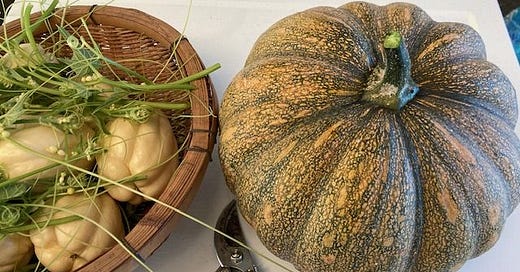The Debt Dragon Is Eating Its Own Tail
The story is undoubtedly apocryphal, but it describes a fundamental truth.
One of my professors in university told a story that I've remembered for 50 years. (The specifics of the class and professor have been lost to the passage of time, but the story remains sharply etched in memory).
The story is undoubtedly apocryphal, but it describes a fundamental truth.
The anthropologist is visiting an indigenous tribe that only recently acquired access to Western goods. The women are working into the night hand-crafting goods to sell for cash. When the anthropologist asks what the money is being earned to buy, the answer is "to buy the kerosene for the lamps so we can work at night."
So you're working into the night to pay for the kerosene for the lamps you need to work into the night. Um, OK....
This makes no sense, as the output of the work (money) is consumed by the work itself. So why do the work in the first place?
It seems obvious (to me) that the global Debt Dragon is eating its own tail in a similar fashion.
To understand this dynamic, we must start with the economy of old, when credit was scarce and generally a function of trade / commerce: those with goods to sell would meet those with money to buy in a trade fair. Credit was backed by the goods being traded--the equivalent of purchase orders or letters of exchange--were traded with credit, and then settled for cash (in the old days, silver or gold) at the close of the fair.
In other words, credit was short-term and settled once the trade was completed. A modern-day equivalent was the American Express Card of a generation or two ago: it wasn't a credit card with a balance carried forward, the monthly charges had to paid in full at the end of the month. For those in business, an American Express Gold Card was like an automated purchase order: you took delivery on goods and services and settled the trade at the end of the month.
In the current global economy, credit is now the lifeblood of any purchase above a low threshold. Very few people can buy a house, vehicle or university education with cash that has been saved out of wages.
The key change is that the purchasing power of wages has lagged the rise in the cost of living and so there is not enough left in discretionary / disposable income to save for major purchases.
The net result is that a great many households are working to service the debts they took on so they could work to pay the interest on their debts.
In other words, we're working to pay the debts we acquire to live. Without credit, we could not buy a house, car, university education, airfare and vacation and so on.
We are working to buy the kerosene so we can work late into the night. The kerosene in the modern economy is debt.
But debt generates an expense above and beyond paying back the loan: interest and its associated fees and penalties. The more debt we take on, the greater the share of our income devoted to interest.
This expansion of credit/debt to fund everyday life has catapulted finance to dominance: the real-world economy is in thrall to finance, for without credit --borrowing money--the real-world economy would quickly grind to a halt and collapse into depression.
Reliance on borrowing money to fund everyday life effectively optimizes the entire economy for debt origination and service rather than for productive labor and investing to increase productivity.
Since wages have fallen so far behind the cost of living, people feel that speculating in asset bubbles is the only way they can make enough money to get ahead of the debt machine eating them alive.
So the second-order effect of an economy optimized for debt origination and service is an economy optimized for unproductive, risky speculation in financial games.
If we look at the sources of human well-being, we find 1) autonomy, 2) belonging and 3) validation of our contributions to the group, i.e. our effort and competence. When these are missing in our lives, we experience emotional exhaustion, depersonalization and a lack of recognition and achievement, all of which lead to burnout and social defeat.
A financialized economy that optimizes debt origination and service isn't an economy optimized for human well-being. It is optimized for exploitation (of borrowers by lenders) precarity, i.e. financial insecurity and anxiety (should income fall below the level needed to service all the debt).
Finance and borrowing money were not always the dominant drivers of the economy. When wages bought far more goods and services, it was possible to save up the money to buy a car cash or work your way through four years of state university without taking on any debt. I know because I did both.
I have made a close study of the purchasing power of wages in my own life, as I have records of my income and expenses stretching back 50+ years. We all know official inflation understates the real loss of purchasing power, but the BLS Inflation Calculator gives us a handy tool to convert past earnings and expenses into present-day dollar values.
I've been self-employed most of my 54 years of working, and my income was very low for long stretches in virtually every decade. This is the tradeoff I made to have autonomy and pursue avocations which are inherently financially risky. My core survival strategy has always been extreme frugality and DIY--do it yourself.
This is why I recall or have records of specific prices and hourly wages stretching back 50+ years. (The Social Security portal has your entire taxable earnings history online.)
Keep reading with a 7-day free trial
Subscribe to Charles Hugh Smith's Substack to keep reading this post and get 7 days of free access to the full post archives.



